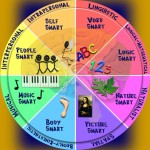 Howard Gardner’s theory of multiple intelligences (MI theory) has revolutionized the field of education. But it also has important implications for developmental psychology. Gardner’s theory says that there are at least eight different intelligences: linguistic (word smart), logical-mathematical (numbers and reasoning smart), spatial (picture smart), musical (music smart), bodily-kinesthetic (body smart)), interpersonal (people smart), intrapersonal (self smart), and naturalist (nature smart).
Howard Gardner’s theory of multiple intelligences (MI theory) has revolutionized the field of education. But it also has important implications for developmental psychology. Gardner’s theory says that there are at least eight different intelligences: linguistic (word smart), logical-mathematical (numbers and reasoning smart), spatial (picture smart), musical (music smart), bodily-kinesthetic (body smart)), interpersonal (people smart), intrapersonal (self smart), and naturalist (nature smart).
One little known part of MI theory suggests that each of the intelligences has its own developmental trajectory through the life span. Music seems to develop earlier than any of the intelligences. We see five year olds performing and composing music (like Mozart). Music also stays robust until late in life. Eubie Blake, Igor Stravinsky, and Leopold Stokowski were all still musically active well into their eighties.
Logical-mathematical intelligence, on the other hand, doesn’t develop as early as music. We don’t see five-year-olds creating their own mathematical theorems. But logical-mathematical intelligence develops pretty early in the lifespan. We DO see teenagers creating unique systems of mathematical thought. Blaise Pascal was sixteen when he came up with some ideas that are still used today by mathematicians. It seems that the most creative time for mathematicians is in adolescence and early adulthood. It’s been said that if a person hasn’t made an original contribution to math by the age of forty, he or she never will.
Of course, if you’re an Olympic-level gymnast (bodily-kinesthetic intelligence), you may be over the hill at the age of eighteen! If you’re in midlife and want to reach high levels of accomplishment in an area that you haven’t spent much time with, then consider linguistic, interpersonal, or intrapersonal intelligences. Toni Morrison didn’t publish her first novel until she was thirty nine! Many world leaders don’t come into their own until after midlife. It takes time to develop wisdom.
No matter who you are, though, it’s never too late to develop all eight of your intelligences. For more information on multiple intelligences, click here. To read about the different trajectories that multiple intelligences have during the life span, see Howard Gardner’s book Frames of Mind, or my book 7 Kinds of Smart.
For more information about the stages of life in different cultures and traditions, see Thomas Armstrong , The Human Odyssey: Navigating the Twelve Stages of Life
For more about the multiple intelligences, see Thomas Armstrong, Multiple Intelligences in the Classroom, 4th Edition and 7 (Seven) Kinds of Smart: Identifying and Developing Your Multiple Intelligences
.
This article was brought to you by Thomas Armstrong, Ph.D. and www.institute4learning.com.
Follow me on Twitte r: @Dr_Armstrong
r: @Dr_Armstrong




















